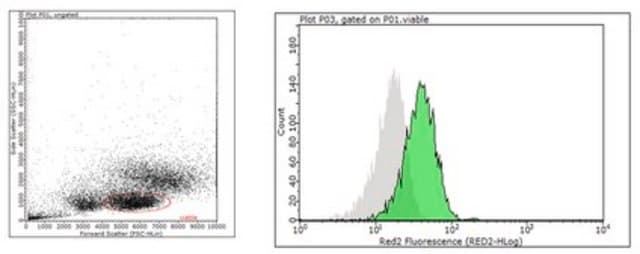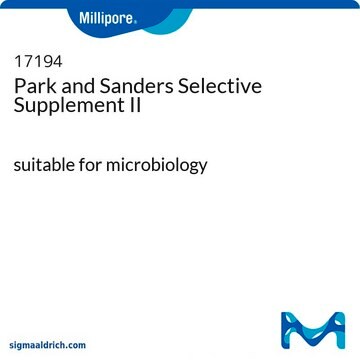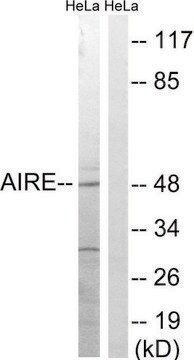09-456
Anti-AIRE Antibody
Upstate®, from rabbit
别名:
APECED protein, Autoimmune polyendocrinopathy candidiasis ectodermal dystrophy
protein, autoimmune polyendocrinopathy candidiasis ectodermal dystrophy 2
autoimmune regulator
, autoimmune regulator (APECED protein), autoimmune
登录查看公司和协议定价
所有图片(1)
About This Item
分類程式碼代碼:
12352203
eCl@ss:
32160702
NACRES:
NA.41
推荐产品
生物源
rabbit
品質等級
抗體表格
affinity purified immunoglobulin
抗體產品種類
primary antibodies
無性繁殖
polyclonal
純化經由
affinity chromatography
物種活性
mouse
製造商/商標名
Upstate®
技術
western blot: suitable
同型
IgG
NCBI登錄號
UniProt登錄號
運輸包裝
wet ice
目標翻譯後修改
unmodified
基因資訊
mouse ... Aire(11634)
一般說明
AIRE (Autoimmune Regulator) is a human gene that is expressed primarily in the thymus. It causes transcription of a wide selection of organ-specific genes, reducing the threat of autoimmunity occurring by allowing the elimination of autoreactive T cells via negative selection. Defects in this gene cause the rare autosomal-recessive systemic autoimmune disease termed autoimmune polyendo-crinopathy-candidiasis-ectodermal dystrophy (APECED). Disruption of AIRE results in the development of a range of autoimmune diseases, the most common clinical conditions in the syndrome are hypoparathyroidism, primary adrenocortical failure and chronic mucocutaneous candidiasis. Aire functions through initiating the transcription of a diverse set of self-antigens, such as insulin, in the thymus. This expression then allows maturing thymocytes to become tolerant towards peripheral organs, thereby suppressing autoimmune disease. Aire is atranscriptional regulator protein that binds to DNA as dimer and tetramer, but not as a monomer. It forms nuclear bodies and interacts with the transcriptional coactivator CBP (CREBBP). At least three splice variant mRNAs products have been described including one which results in a premature stop codon and a transcript predicted to be a candidate for nuclear-mediated decay (NMD).
特異性
Likely to cross-react with rat, based on sequence homology. Cross-reactivity with other species has not been tested
Recognizes murine AIRE, Mr 58 kDa (calculated). Appears at ~65 kDa in Western blots.
免疫原
Epitope: a.a. 162-181
KLH-conjugated synthetic peptide corresponding to amino acids 162-181 of mouse AIRE
應用
Suggested dilutions:
Western blot: 1:1000
Western blot: 1:1000
Detect AIRE using this Anti-AIRE Antibody validated for use in WB.
Research Category
Inflammation & Immunology
Inflammation & Immunology
Research Sub Category
Developmental Signaling
Transcription Factors
RNA Binding Protein (RBP)
Developmental Signaling
Transcription Factors
RNA Binding Protein (RBP)
品質
Routinely evaluated by Western Blot analysis.
Western Blot:
A 1:1000 dilution of this lot detected AIRE in murine thymus lysate
Western Blot:
A 1:1000 dilution of this lot detected AIRE in murine thymus lysate
標靶描述
65 kDa
外觀
ImmunoAffinity Purified
100 μg of immunoaffinity purified rabbit polyclonal IgG in 173 μl of 0.02M PBS, 0.25M NaCl containing 0.1% sodium azide
儲存和穩定性
2 years at -20°C from date of shipment. Upon first thaw, and prior to removing the cap, centrifuge the vial and gently mix the solution. Aliquot into microcentrifuge tubes and store at -20°C. Avoid repeated freeze/thaw cycles, which may damage IgG and affect product performance. Note: Variability in freezer temperatures below -20°C may cause glycerol-containing solutions to become frozen during storage.
分析報告
Control
Murine thymus tissue lysate
Murine thymus tissue lysate
法律資訊
UPSTATE is a registered trademark of Merck KGaA, Darmstadt, Germany
免責聲明
Unless otherwise stated in our catalog or other company documentation accompanying the product(s), our products are intended for research use only and are not to be used for any other purpose, which includes but is not limited to, unauthorized commercial uses, in vitro diagnostic uses, ex vivo or in vivo therapeutic uses or any type of consumption or application to humans or animals.
未找到合适的产品?
试试我们的产品选型工具.
儲存類別代碼
10 - Combustible liquids
水污染物質分類(WGK)
WGK 2
閃點(°F)
Not applicable
閃點(°C)
Not applicable
Noriyuki Kuroda et al.
Journal of immunology (Baltimore, Md. : 1950), 174(4), 1862-1870 (2005-02-09)
Autoimmune regulator (AIRE) gene mutation is responsible for the development of organ-specific autoimmune disease with monogenic autosomal recessive inheritance. Although Aire has been considered to regulate the elimination of autoreactive T cells through transcriptional control of tissue-specific Ags in thymic
Mark S Anderson et al.
Science (New York, N.Y.), 298(5597), 1395-1401 (2002-10-12)
Humans expressing a defective form of the transcription factor AIRE (autoimmune regulator) develop multiorgan autoimmune disease. We used aire- deficient mice to test the hypothesis that this transcription factor regulates autoimmunity by promoting the ectopic expression of peripheral tissue- restricted
Chris Ramsey et al.
Human molecular genetics, 11(4), 397-409 (2002-02-21)
Autoimmune polyendocrinopathy-candidiasis-ectodermal dystrophy (APECED) is a monogenic autosomal recessive disease caused by mutations in the AIRE gene. Here we have produced knock-out mice for the Aire gene. The Aire-/- mice develop normally; however, autoimmune features of APECED in Aire-/- mice
Adrian Liston et al.
Nature immunology, 4(4), 350-354 (2003-03-04)
Autoimmune polyendocrinopathy syndrome type 1 is a recessive Mendelian disorder resulting from mutations in a novel gene, AIRE, and is characterized by a spectrum of organ-specific autoimmune diseases. It is not known what tolerance mechanisms are defective as a result
Wenyu Jiang et al.
The Journal of experimental medicine, 202(6), 805-815 (2005-09-21)
Loss of function mutations in the autoimmune regulator (Aire) gene in autoimmune polyendocrinopathy-candidiasis-ectodermal dystrophy patients and mutant mice lead to autoimmune manifestations that segregate as a monogenic trait, but with wide variation in the spectrum of organs targeted. To investigate
我们的科学家团队拥有各种研究领域经验,包括生命科学、材料科学、化学合成、色谱、分析及许多其他领域.
联系技术服务部门








